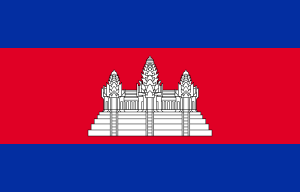Language/Central-khmer/Vocabulary/Money-and-Currency
| ◀️ Shopping Vocabulary — Previous Lesson | Next Lesson — Using Prepositions ▶️ |
Introduction[edit | edit source]
In this lesson, we will delve into the topic of money and currency in Central Khmer. Money is an essential aspect of our daily lives, and being able to discuss it in the Central Khmer language is crucial for effective communication. We will cover vocabulary related to bills, coins, and exchanging money, providing you with the necessary tools to navigate financial transactions in a Central Khmer-speaking environment.
This lesson is part of the larger course titled "Complete 0 to A1 Central Khmer Course," designed for complete beginners who aim to reach the A1 level of proficiency in Central Khmer. By the end of this lesson, you will have a solid understanding of money and currency in Central Khmer, enabling you to engage in basic financial conversations and transactions.
Central Khmer Vocabulary for Money and Currency[edit | edit source]
To begin, let's explore the essential vocabulary for money and currency in Central Khmer. Familiarize yourself with these words and their pronunciations to enhance your communication skills.
Central Khmer Currency[edit | edit source]
In Central Khmer, the official currency is the Riel (៛). Here are some common words related to Central Khmer currency:
| Central Khmer | Pronunciation | English Translation |
|---|---|---|
| រៀល | riəl | Riel |
| ដុល្លារ | dolər | Dollar |
| មុនដ្ឋាន | mɔndɑːn | Bank |
| អាកាស | aːkaas | ATM |
Bills[edit | edit source]
In Central Khmer, bills are referred to as "រូប" (roob). Here are the words for different denominations of bills:
| Central Khmer | Pronunciation | English Translation |
|---|---|---|
| រូបមួយ | roob muəj | One dollar bill |
| រូបពីរ | roob pii | Two dollar bill |
| រូបបី | roob bei | Three dollar bill |
| រូបបួន | roob buən | Four dollar bill |
| រូបប្រាំ | roob pram | Five dollar bill |
| រូបប្រាំមួយ | roob pram muəj | Ten dollar bill |
| រូបដប់ | roob dab | Twenty dollar bill |
| រូបសាមសិប | roob saam saəp | Fifty dollar bill |
| រូបរាំមួយ | roob raam muəj | One hundred dollar bill |
Coins[edit | edit source]
In Central Khmer, coins are referred to as "បង្កង" (baŋkaŋ). Here are the words for different denominations of coins:
| Central Khmer | Pronunciation | English Translation |
|---|---|---|
| បង្កងមួយ | baŋkaŋ muəj | One coin |
| បង្កងពីរ | baŋkaŋ pii | Two coins |
| បង្កងបី | baŋkaŋ bei | Three coins |
| បង្កងបួន | baŋkaŋ buən | Four coins |
| បង្កងប្រាំ | baŋkaŋ pram | Five coins |
| បង្កងប្រាំមួយ | baŋkaŋ pram muəj | Ten coins |
Exchanging Money[edit | edit source]
When you need to exchange money, you will likely encounter certain words and phrases. Here are some essential vocabulary words related to exchanging money:
| Central Khmer | Pronunciation | English Translation |
|---|---|---|
| កាត់ដេរ | kaat der | Exchange |
| អាចរកប្រាក់បានដំណើរការដ៏ល្អ | aah rək prɑːkaəb dɑmnɨɨk daəl | Get a good exchange rate |
| អាចដកប្រាក់បានត្រឹមត្រូវ | aah daək prɑːkaəb daəl trəm truu | Get the correct change |
| អាចរកប្រាក់បានភ្លាមៗ | aah rək prɑːkaəb dɑəl pləəm pləəm | Get various denominations |
Cultural Insights[edit | edit source]
Understanding the cultural context surrounding money and currency in Central Khmer is essential for effective communication. Here are some cultural insights related to this topic:
1. Importance of Bargaining: In Central Khmer markets and certain stores, bargaining is a common practice. It is expected that customers negotiate the price, especially when dealing with street vendors or in local markets. Don't be afraid to negotiate and find a mutually agreeable price.
2. Respect for Currency: In Central Khmer culture, money is highly regarded and respected. It is considered impolite to throw or mishandle money. Treat currency with care and avoid any actions that may be seen as disrespectful.
3. Cash Dominance: While electronic payment methods are becoming more prevalent, cash is still the primary form of payment in Central Khmer. It is advisable to carry sufficient cash when traveling or engaging in financial transactions.
4. Exchanging Money: When exchanging money, it is essential to choose reputable exchange services or banks to ensure fair rates and avoid scams. Ask for recommendations from locals or trusted sources to find reliable exchange options.
Practice Exercises[edit | edit source]
Now it's time to practice what you have learned. Here are some exercises to reinforce your understanding of money and currency in Central Khmer:
Exercise 1: Vocabulary Matching Match the Central Khmer words with their English translations.
1. រៀល a. Dollar 2. ដុល្លារ b. ATM 3. មុនដ្ឋាន c. Riel 4. អាកាស d. Bank
Exercise 2: Role Play Imagine you are in a Central Khmer market. Practice a dialogue with a classmate or a language partner, simulating a conversation between a buyer and a seller. Use the vocabulary you have learned to discuss prices, exchange money, and negotiate.
Exercise 3: Currency Conversion Convert the following amounts from dollars to riel: a) $10 b) $25 c) $50
Solutions[edit | edit source]
Exercise 1: Vocabulary Matching 1. c. រៀល a. Dollar 2. b. ដុល្លារ b. ATM 3. d. មុនដ្ឋាន c. Riel 4. a. អាកាស d. Bank
Exercise 2: Role Play Dialogue examples will vary. Focus on using the vocabulary related to money and currency in your conversation.
Exercise 3: Currency Conversion a) ៛40,000 b) ៛100,000 c) ៛200,000
Congratulations on completing the exercises! You are now one step closer to mastering money and currency in Central Khmer.
Sources[edit | edit source]
Other Lessons[edit | edit source]
- Languages ភាសា
- Common Greetings
- Weather Vocabulary
- Discussing Interests
- Telling Time
- Family Members
- Relationship Status
- Express Surprise
- Health
| ◀️ Shopping Vocabulary — Previous Lesson | Next Lesson — Using Prepositions ▶️ |

